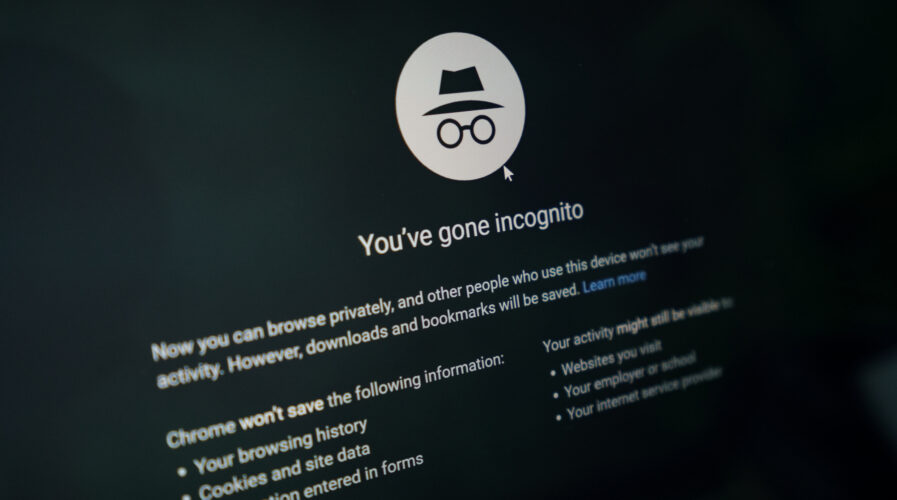
Is Google Incognito Mode really private? Source: Shutterstock
Is Google Incognito Mode really private?
- Apparently, Google makes clear that ‘Incognito’ does not mean ‘invisible,’ and that the user’s activity during that session may be visible to websites they visit, including third-party analytics or ads services
- It is unclear though if the general public is aware of Incognito’s true usage style, but a recent lawsuit could force Google to more explicitly tell users what it does and doesn’t collect
Google surreptitiously amasses billions of bits of information daily, about internet users, even if they opt-out of sharing their information. That is the truth about the search engine’s ‘incognito mode’ — it does not actually mean private browsing as some might have perceived it.
To top it off, Google, in an attempt to kill a lawsuit the company is facing in the US, reiterated that ‘Incognito’ does not mean ‘invisible,’ and that the user’s activity during that session may be visible to websites they visit, and any third-party analytics or ads services the visited websites use.
In June 2020 proposed class-action lawsuit, three consumers alleged the Alphabet Inc.’s unit of tracking and collecting consumer browsing history and other web activity data no matter what safeguards consumers undertake to protect their data privacy. Google had sought to have the case thrown out, but last Friday, US District Judge Lucy Koh wrote in her ruling that the company “did not notify users that Google engages in the alleged data collection while the user is in private browsing mode.”
The truth about Google incognito mode
The company’s lawyers explained in their motion, “Google also makes clear that ‘Incognito’ does not mean ‘invisible,’ and that the user’s activity during that session may be visible to websites they visit, and any third-party analytics or ads services the visited websites use.”
Google reiterated that Chrome’s Incognito mode gives users the choice to browse the internet without the activity being saved to their browser or devices. “As we clearly state each time you open a new incognito tab, websites might be able to collect information about your browsing activity during your session.”
It is unclear though if the general public is aware of Incognito’s true behavior but the lawsuit could force Google to more explicitly tell users what it does and doesn’t collect. The complaint also serves as a criticism of companies that bury important information in their terms of service. Few people read those agreements from start to finish, and that can cause problems when privacy is at stake.
According to the complaint filed in June last year, three Google users claim the company carries on a “pervasive data tracking business.” Google collects browsing history and other web activity data even after users employ safeguards to protect their data such as using “Incognito” private browsing mode, read the complaint. Google however argued the plaintiffs consented to its privacy policy, which the company said explicitly discloses its data collection practices.
The ruling comes as Google and Apple Inc. face intense scrutiny by lawmakers over their data gathering practices. The former has said it will next year eliminate third-party cookies that help advertisers keep tabs on consumers’ web activity and won’t employ alternative methods to track individuals.
So is incognito mode really private?
For clarity, private browsing has a lot of names, including InPrivate for Microsoft Edge and Incognito Mode for Google Chrome. Its purpose is to give your browser temporary amnesia and that whenever you’re in incognito mode, the browser will not store the data of the sites you visited: no addresses, no cookies, none of the data you entered.
A thorough check on Google Chrome Incognito mode will show that indeed, no information searched in that mode will appearing your browsing history, it doesn’t mean that it is not being tracked. Websites you visit might be able to see your IP address, internet service providers can still see activity, and system administrators at your workplace will still know what you were up to when you were supposed to be working.
While Incognito mode may offer some privacy, it doesn’t provide total anonymity. Additionally, it provides no web protection against hackers or government surveillance.
READ MORE
- Ethical AI: The renewed importance of safeguarding data and customer privacy in Generative AI applications
- How Japan balances AI-driven opportunities with cybersecurity needs
- Deploying SASE: Benchmarking your approach
- Insurance everywhere all at once: the digital transformation of the APAC insurance industry
- Google parent Alphabet eyes HubSpot: A potential acquisition shaping the future of CRM


